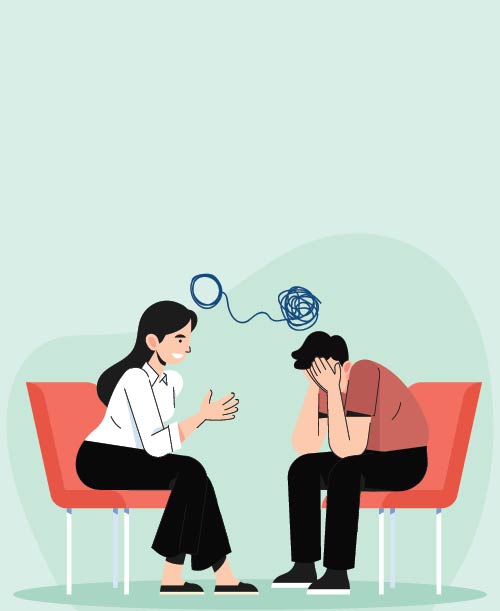The Do’s and Don’ts of Effective Marriage Counselling
The Importance of Mental Health And Wellness: a Deep Dive Into Counseling, Therapy, and Their Advantages
Mental health and wellness considerably forms specific health, influencing emotions, ideas, and actions. Therapy and treatment function as necessary opportunities for recovery and individual development. They use structured assistance, aiding people navigate life's challenges. Many continue to be uninformed of the specific kinds of therapy available and their special advantages. Recognizing these elements is crucial for anyone thinking about specialist mental wellness assistance. What adheres to may illuminate courses to resilience and gratification that several overlook.
Understanding Mental Health And Wellness and Its Effect
Although psychological wellness is usually neglected, it plays a crucial duty in general wellness and day-to-day performance. It encompasses emotional, emotional, and social aspects that affect how individuals assume, really feel, and act. A person's psychological health and wellness straight impacts their capacity to take care of anxiety, connect to others, and choose. Poor psychological health can bring about different concerns, including anxiety, anxiety, and problem in preserving connections, all of which can prevent specialist and personal growth.Furthermore, psychological health and wellness has far-ranging effects for physical health and wellness. Persistent tension and untreated psychological conditions can add to different physical conditions, such as heart problem and compromised immune feedbacks. On the other hand, favorable psychological health and wellness fosters strength, enabling people to deal with life's obstacles properly. Recognizing mental health and wellness's significance is important for fostering supportive settings that advertise psychological health, thus improving the top quality of life for people and communities alike
The Various Kinds of Counseling and Therapy
In the domain of mental health, different therapy and therapy kinds satisfy diverse demands. Individual counseling techniques concentrate on personal concerns via individually sessions, while team treatment dynamics foster shared experiences and support among participants. Understanding these methods is essential for selecting the suitable treatment for various obstacles.
Individual Therapy Techniques
Countless individual therapy approaches exist, each made to attend to particular mental health and wellness problems and deal with differing client requirements. Cognitive Behavioral Therapy (CBT) concentrates on identifying and transforming negative idea patterns, while Psychodynamic Therapy discovers past experiences and unconscious procedures. Humanistic Treatment stresses individual development and self-actualization, fostering an encouraging environment. Interpersonal Treatment (IPT) targets relationship issues and interaction patterns to enhance psychological wellness. Furthermore, Approval and Dedication Treatment (ACT) motivates customers to approve their ideas and feelings while committing to personal values. Each method provides special strategies and approaches, allowing practitioners to customize their approaches to the person, thus improving the healing experience and advertising psychological health and wellness recuperation.
Team Treatment Dynamics
Team treatment characteristics incorporate numerous restorative approaches that utilize the power of social partnerships and shared experiences. This type of treatment typically includes varied groups, cultivating a secure setting for individuals to express thoughts and sensations. Trick types of team treatment consist of support system, which supply emotional support; process-oriented groups, concentrating on social communications; and psychoeducational teams, focused on passing on expertise about psychological health issues. The dynamics within these groups can improve self-awareness, as participants commonly reflect on their habits in connection with others. Additionally, team therapy promotes a feeling of belonging, reducing sensations of seclusion. Through shared stories and cumulative problem-solving, individuals can develop coping techniques and get insights, inevitably adding to specific growth and recovery.
The Duty of Therapy in Mental Wellness
Therapy plays an important role in mental health and wellness by using different methods customized to individual demands. These techniques supply professional assistance that can bring about significant improvements in emotional well-being. Understanding the different kinds of counseling can help individuals make educated choices regarding their mental wellness care.

Sorts Of Counseling Techniques
While numerous therapy methods exist, each offers one-of-a-kind methods and insights right into psychological health treatment - Cognitive Behavioural Therapy. Amongst the most noticeable are cognitive-behavioral treatment (CBT), which focuses on changing negative thought patterns; psychodynamic treatment, which explores unconscious processes and childhood experiences; and humanistic techniques, emphasizing individual growth and self-actualization. Furthermore, solution-focused quick therapy prioritizes finding remedies in the present instead of diving right into troubles. Group therapy promotes area and shared experiences, while household therapy addresses relational dynamics within familial frameworks. Each approach provides to various requirements, lining up with private preferences, issues, and healing goals. Comprehending these methods aids clients make informed options concerning their psychological health journey and promotes efficient treatment customized to their unique scenarios
Advantages of Professional Guidance
Many people profit from professional advice in handling their mental wellness obstacles. Counseling provides a secure space for clients to explore their ideas and feelings without judgment. This therapeutic setting promotes self-awareness, allowing people to determine patterns in their habits and establish healthier coping strategies. Expert advice likewise provides accessibility to evidence-based techniques that can ease signs and symptoms of stress and anxiety, clinical depression, and various other mental health concerns. Counselors can aid in setting reasonable objectives and offer assistance in accomplishing them, enhancing general health. The collective relationship in between counselor and customer is necessary, as it promotes accountability and encourages individual growth. Eventually, professional support plays an essential role in you could look here guiding mental wellness journeys, bring about boosted psychological durability and life complete satisfaction.
Benefits of Therapy: Recovery and Development

How to Select the Right Therapist or Therapist
Just how can one navigate the commonly overwhelming procedure of choosing the ideal therapist or counselor? Identifying personal demands is vital; individuals must consider their certain issues, whether partnership, anxiousness, or anxiety difficulties. It is beneficial to research numerous healing methods, such as cognitive-behavioral treatment or psychodynamic therapy, to discover an appropriate match.Next, prospective clients ought to look for recommendations from relied on sources or make use of online directories. It is vital to assess specialists' qualifications, including their education and learning, licensing, and locations of expertise. Setting up initial consultations can help evaluate compatibility, check my blog permitting people to analyze communication styles and individual comfort.Finally, logistical aspects, such as place, schedule, and charges, should also be taken into consideration. By thoughtfully evaluating these components, one can make an informed decision, eventually fostering a healing partnership that supports mental health and wellness and individual growth.
Conquering Preconception: Accepting Mental Health Assistance
While societal perspectives towards mental wellness have advanced, stigma still presents a substantial obstacle for numerous looking for assistance. This preconception commonly materializes as misunderstandings surrounding mental disease, leading individuals to really feel shame or concern concerning their battles. Many individuals think twice to go after counseling or therapy because of fears about being evaluated or labeled. Overcoming this preconception is fundamental for promoting a supportive setting where people can freely review their mental health and wellness needs.Communities and organizations play a crucial function in this transformation by advertising awareness and education and learning concerning psychological health and wellness problems. Initiatives that highlight personal stories can humanize these experiences, urging others to seek aid without fear. As approval expands, people may feel much more empowered to welcome psychological health and wellness assistance, acknowledging it as an essential facet of overall wellness. By taking down stigma, culture can cultivate a society of understanding, compassion, and positive psychological healthcare.
Strategies for Maintaining Psychological Wellness Beyond Treatment
Although therapy gives beneficial support, maintaining mental wellness beyond sessions is just as essential. Individuals can implement a number of approaches to maintain their mental wellness. Normal physical activity plays an important function, as workout advertises the launch of endorphins, which improve mood. In addition, a balanced diet rich in nutrients can substantially impact emotional stability and energy levels.Practicing mindfulness and meditation helps individuals handle tension and establish better self-awareness. Developing a consistent sleep routine is likewise fundamental, as high quality rest is essential for cognitive feature and psychological regulation.Engaging in social tasks promotes connection and minimizes feelings of seclusion. Going after rate of interests or pastimes can give a creative electrical outlet and boost self-confidence. Establishing realistic goals and practicing self-compassion allows individuals to grow durability. By incorporating these techniques right into life, individuals can successfully support their mental wellness past treatment sessions.
Regularly Asked Questions

Exactly How Can I Inform if I Required Treatment?

Identifying the need for therapy typically includes identifying consistent sensations of sadness, anxiousness, or frustrating stress and anxiety. If everyday working becomes difficult or coping systems fall short, seeking specialist assistance might be a beneficial progression.
What Should I Anticipate in My Initial Therapy Session?
In the very first therapy session, people can expect an introduction, conversation of their reasons for seeking help, and a summary of the specialist's strategy, creating a structure for future discussions Discover More and developing convenience in the therapeutic area.
Are Online Therapy Sessions as Effective as In-Person Ones?
Study shows that online therapy sessions can be as effective as in-person ones. Elements such as the therapist's qualifications, customer involvement, and the therapeutic partnership considerably influence results, despite the medium utilized.
Can Treatment Aid With Relationship Problems?
Treatment can aid people in dealing with connection problems by supplying tools for interaction, understanding feelings, and settling problems. Couples Therapy. It promotes much healthier characteristics and encourages individual development, ultimately cultivating more powerful, a lot more satisfying links in between partners
Exactly How Lengthy Does Treatment Typically Last?
Therapy period varies considerably based upon specific requirements and objectives. Normally, sessions might last from a few weeks to a number of months, with some individuals taking part in recurring therapy to address lasting issues and individual development. Cognitive Behavior Treatment (CBT) focuses on identifying and transforming adverse thought patterns, while Psychodynamic Treatment checks out previous experiences and unconscious processes. Trick kinds of group treatment include assistance groups, which give psychological assistance; process-oriented teams, concentrating on social interactions; and psychoeducational groups, aimed at passing on understanding concerning psychological health and wellness issues. Amongst the most prominent are cognitive-behavioral treatment (CBT), which concentrates on modifying adverse idea patterns; psychodynamic therapy, which checks out unconscious procedures and childhood years experiences; and humanistic strategies, stressing personal growth and self-actualization. Team therapy promotes neighborhood and shared experiences, while family therapy addresses relational characteristics within familial structures. It is helpful to research study various therapeutic strategies, such as cognitive-behavioral therapy or psychodynamic treatment, to discover a suitable match.Next, prospective clients need to seek references from trusted resources or utilize online directories.